The Lovin' Spoonful
Albums reviewed on this page: Do You
Believe in Magic?, Daydream, What's
Up Tiger Lily?, Hums of the Lovin' Spoonful,
Everything Playing.
I've always been a little surprised that the big New York folk
scene didn't kick out more groups. I guess that may be because
the folk scene was so vibrant it crowded out everyone else.
Let's see - there's the Lovin' Spoonful (the folky/country band) the
Youngbloods (more rock/country), the
Blues Project (R&B and a little
bit of everything), with a couple of infamous weirdos as well (the
Velvet Underground, the Fugs).
The Lovin' Spoonful was mainly John Sebastian, a smiling man with
glasses who sounds like the nicest guy you'll ever meet.
Alongside noted goofball and guitar chamelion Zal Yanovsky, the
Spoonful charted course for all the down-home good-time places that
music could go. The band scored some early success with
happy-go-lucky songs like "Do You Believe in Magic?" and
then ventured further into their roots. Some people really like
Hums of the Lovin' Spoonful, but I'd say start with Do You
Believe in Magic? first and then work your way down. The
band never really embraced any experimentalism or psychedelia, and
fell apart after Yanovsky got busted for drugs in mid-'67.
Sebastian stayed on for one uneven album, Everything Playing,
before bailing. He launched a semi-successful solo career as a
singer-songwriter, most known today for making the theme to the
Welcome Back Kotter TV show.
Even though the band isn't really cool or hip (more goofy) they
made some good music anticipating the post-Altamont return of the
roots.
Personnel:
Steve Boone (bass), Joe Butler (drums, vocals), John
Sebastian (vocals, guitar), Zal Yanovsky (lead guitar,
vocals). Yanovsky left after You're a Big Boy Now,
replaced by Jerry Yester (guitar, vocals).
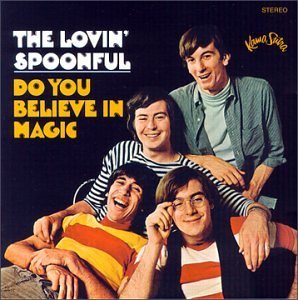 Do
You Believe in Magic? (mono version) (1965), ***1/2
Do
You Believe in Magic? (mono version) (1965), ***1/2
So
it's 1965 and you want to record an album. What do you do?
Copy the Beatles? Probably. Copy the Byrds?
Even better (especially if you're American). Maybe some good
old R&B can work its way in there. Not so for these boys.
No, they went for a humerous, good-time country-blues sound.
Aka jugband blues. The dictionary definition of this term is
unavailable to me right now, but it appears to consist of playing a
country-blues song with goofy lyrics, in a self-knowing way.
Although they play with a friendly slack-jawed tone, they are not
authentic rusticans singing about fishing or whatnot. Nor are
they trying to be - it's pretty clear that they didn't take this
persona very seriously (they were too precise and too good), neither
did their audience, and thus everyone was satisfied. This was
the same sort of wackiness that smacks of Beatles movies, and goofing
around. Sure enough, the Lovin' Spoonful had their own
Designated Goofball, who went by the name of Zalman Yanovsky.
Believe me, if you had been born with a delightfully colorful name
like that you have only two options. 1) You can become some
sort of mild-mannered white-collar person, who will be only
remembered for the letdown associated with reading that name on a
business card and then meeting a milquetoast ruddy-faced gentleman in
a starched white shirt. (One of God's little ironies, I
speculate). OR 2) You can be the goofball lead guitarist for a
jugband blues group, and spend your time cranking out bluesy leads
over your bandmates, and be the talented Ringo of your own little
world.
On the other hand,
John Sebastian is the creative man of the group - and he has the
tortoise shell glasses to prove it. Sebastian seems to be the
oracle for warm, fuzzy pop songs. The man simply writes for
sunny afternoons in the country, and the title track is such a
perfect example - comfortable, fresh and youthful. These
guys seemed to draw on both old country music and folk to create
something inherently American. (Much as I hate the term, this
appears to be Americana at its finest.) Yes, here's some Chuck
Berry, here's a country song. The sunny disposition of the band
is evident in comparing their version of Fred Neil's "Other Side
of This Life" with the Youngbloods'
subsequent cover. The Spoonful's has a swinging beat, and sound
like a local C&W cover band with acoustic guitar and autoharp.
The Youngbloods' version is more rocking, and dark and bluesy, much
like the Youngbloods themselves. The same holds true with the more
traditional blues tracks. It being 1965, the blues and R&B
were inescapable, thanks to the UK. The Spoonful doesn't
try to go for the gritty, guitar based blues from across the
Atlantic. This is more of the Paul Butterfield variety
(Sebastian on harp), but not as uptempo and energetic as New York
compatriots the Blues Project.
This was more of the slow, deliberate country blues, and it's good.
The jugband stuff is fun, in that 1965 humor way.
Hopefully you can laugh at a song that discusses in stride being
chased by crazy women with rusty razors, drowning cats, glue
sniffing, and the like. But this is good stuff - not the
acoustic harmonized (and Dylanized) folk of the Byrds. It's
electric (mostly), funny, and predicts both the smiling sunny
disposition of the coming years through Sebastian, but also the
hybrid country-blues inclinations of the same, through a combination
of Sebastian and Zal.
Thus, the Lovin'
Spoonful were launched on their happy, go-lucky way. Produced
by Erik Jacobsen.
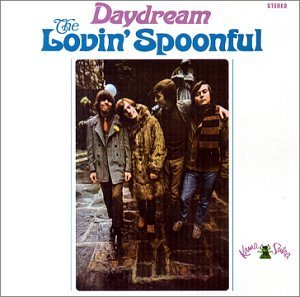 Daydream
(1966), ***1/2
Daydream
(1966), ***1/2
Not
much change from the debut - the Spoonful added more vocal harmonies,
and trended more towards Rubber Soul folk-rock.
Daydream's two big singles (the title track and "You
Didn't Have to Be So Nice") continue Sebastian's gentle love of
the world balladry. The man really knew how to evoke a summer's
day - I think a frown would have been impossible from him. The
title track has something of an old-time rag in it, and is quite the
ode to life - at one point he wants to bury his face in a new-mown
lawn! That is a love of the outdoors, folks. The
other big hit, "You Didn't Have to Be So Nice" is a
folk-rock charmer - full of promise, thanks and appreciation.
Sebastian may have the same approach to both nature and women -
admiration and gratitude. Even their blues are not of the
"woman left me" variety; they are more world weary than
anything else. the lowest he gets is on "It's Not Time
Now" which is about constructive arguing. It's a country
song, about learning from disagreements. The Beatles
might have had "We Can Work it Out" and Brian Wilson was
cooking up all sorts of ways to be gorgeously sad, but John Sebastian
comes out looking more perceptive than all of them on this track.
While I may have written "country song," in truth it
inhabits that ground in between country blues and folk that the
Spoonful have permanent lodgings in. The friendly jug band
music continues apace ("Bald Headed Lena", the sing-along
choruses of "Jug Band Music"). These songs had to be
crowd pleasers - just a bit of fun, as opposed to the relatively
serious Byrds. A Chuck Berry worship track shows up again "Let
the Boy Rock and Roll" - Berry's music was just about drifting
into Americana as well at this point. The blues make their
return, as "Day Blues" and the closing instrumental
"Big Noise from Speonk." Joe Butler's vanilla
baritone graces a few of these tracks ("There She Is" - a
Rubber Soul knockoff, with Zal nailing Harrison's guitar tone,
and "Butchie's Tune" - a "leaving you" ballad),
and while his voice is forgettable, not bad, at least on "Butchie's
Tune" his sad, timid vocals do match the feel of the song. No
real change from the debut, just another good time. Again
produced by Jacobsen.
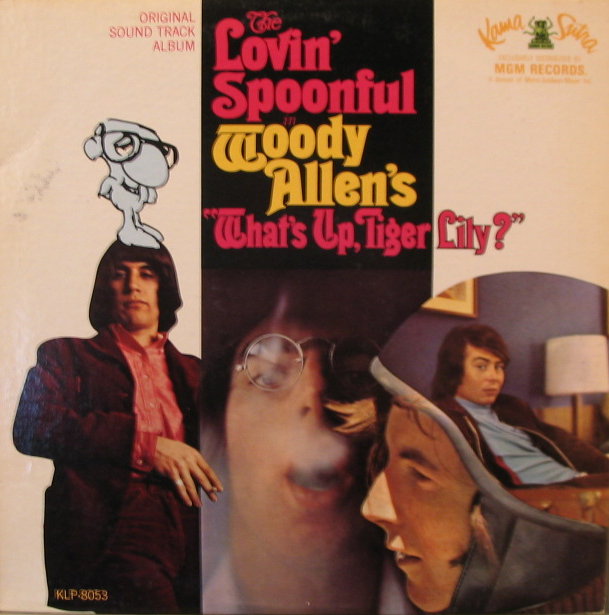 What's
Up Tiger Lily? (1966), *1/2
What's
Up Tiger Lily? (1966), *1/2
This
was the soundtrack to an early Woody Allen film, and it's atrocious.
I have seen the film, and it's as dated as go-go dancers.
Allen's idea was to overdub his own script onto a Japanese spy film.
According to the liner notes, the band was asked to come up with a
soundtrack on Monday, before leaving for Europe on Wednesday.
They were filmed performing it on a stage with no audience, and then
the footage was interspersed in the film. This is a half hour
album, and the two real songs ("Pow (Theme from What's Up Tiger
Lily?)" and "Respoken") constitute under five minutes
of time total. The rest are instrumental versions of other
songs ("Pow Revisited", "Speakin' of Spoken",
etc) and Allen's prefatory description of the project lifted from the
film ("Introduction to Flick"). The most egregious
example of shoddiness: not only is "Fishin' Blues" cut and
pasted from their first album, it's also reprised as the "End
Title." I guess hardcore fans might want to hear an
embyonic version of Hums' delightful "Coconut Grove"
titled "Lookin' to Spy" here. Sure, they boys make
some appropriately weird spy movie background music from time to
time, and there's some nice throwaway guitar lines, but this is
superfluous at best.
I wonder if you could
pass this off as atmospheric rock?
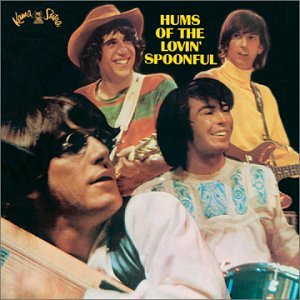 Hums
of the Lovin' Spoonful (mono version) (1966),
***
Hums
of the Lovin' Spoonful (mono version) (1966),
***
Sebastian
pushed the band further into Americana at this point, but it starts
to run counter to the band's zaniness, even when incorporating it.
So, you have an odd unsettling compromise between wackiness of A
Hard Day's Night (the movie) and variety a la The Monkees (the
television show) variety, and rootsy pop-rock. In other words,
the band separated their sound back into its component parts, while
retaining the goofball humor of jugband music. So alongside the
very appropriate Sebastian warm lovey-dovey material (the straight
Dixieland "Bes' Friends") there is down-home country
nonsense ("Henry Thomas"), and goofy blues-rock ("Voodoo
in My Basement"), all with the sort of general happiness that
apparently Sebastian effused at all times. Even when Zal dusts
the slide guitar broom to create the hardest rocking track on here
("4 Eyes") the song is about schoolyard taunts aimed at
those with glasses ("4 Eyes / what you gonna do now / ha ha
ha"). This sort of thing really depends on your sense of
humor to be effective. Even Joe Butler got to do his usual
thing: a bland outdated pop song ("Full Measure") - the guy
really was the Steve Katz of the
group: a not terribly talented vocalist who gets bought off with a
track of his own on each album. Or maybe Butler was the Ringo
of the group after all... Zal was still at it, thankfully,
crafting those guitar lines to complement whatever harebrained scheme
Sebastian cooked up. Sebastian was drawn toward more towards
the country side of things, to the point of recording a goofy ode to
Nashville session men which somehow made the Top Ten ("Nashville
Cats"). Even though the music is pure country,
Sebastian's lyrics are almost in jest, although I did notice he
wrongly places the Sun record label in Nashville. One of
the band's strongest moments is on the languid "Coconut Grove"
which is a cool, moody track with more sadness in it than Sebastian
had previously displayed. Don't worry, he still writes the
happy acoustic songs we all know and love (the folk-rock of "Darlin'
Companion", "Rain on the Roof") and even gets a bit
punchy and urban on "Summer in the City" with its pounding
piano. Even though it is the latter track which is best
remembered today, the others are little jewels of summer warmth and
happiness. In
summary, the band was diversifying their sound, but not having the
same level of success as before. Still a slightly above average
album, however.
You're a Big Boy Now (1967)
Another
soundtrack, this one to a Francis Ford Coppola film (thanks Fidel,
again). I have never seen either. The band was having
issues at this point, and this was their only album from the crazy
big year of 1967. Most of their singles released that year
would up on Everything Playing. Oh, and Francis Ford
Coppola rocks.
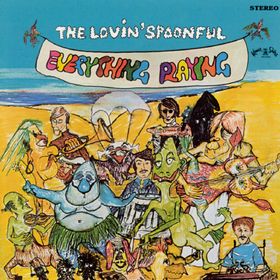 Everything
Playing (1968), **1/2
Everything
Playing (1968), **1/2
The
band was going through a rough patch the previous year, both in terms
of personnel (losing Zal) and declining chart success.
Psychedelia seems to have passed them for the most part, which may
account for some of it. Instead, Zal's replacement Jerry Yester
brought in strings/horns/etc on the tracks, giving the band a
quasi-Moody Blues feel. Yester was only nominally Zal's
successor - he is only a "warm body" on guitar and the bulk
of his arranging is reminiscent of his previous work with West Coast
pop group the Association. Everything Playing,
most of which was released on singles during the prior year, has good
stretches and bad, but goes in a direction known for a lack of
scenery, sort of like traveling to rural Iowa.
You only realize how
important Sebastian's vocals when he isn't the one singing.
Although Sebastian wrote the bulk of the songs on here, turning a
goofy song featuring vegetables cheating on each other ("Priscilla
Millionaira"), over to Yester, Boone or whomever to sing is
instantly a mistake. I think it is Yester, but it doesn't
matter because the vocals are awful: flat, amateur with the amazing
technique of singing louder to add emphasis. Butler is still
kicking, and he got to write this time, showing up with both "Old
Folks" and "Only Pretty, What a Pity." They are
pretty good for a beginner: character pieces, and the latter satire.
Butler was also more ambitious than Sebastian ever tried to be on
"Only Pretty, What a Pity", adding a more experimental
section with distorted vocals and violin. It is likely to
produce only a shoulder shrug in the listener, though, as almost
anything Butler seems to be singing is tarred with mediocrity
(although this is top-shelf mediocrity).
Thankfully, Sebastian
shows up in full frequently enough. With the band he
contributes two fine singles: "She Is Still a Mystery" and
"Six O'Clock", which is well-done orchestrated pop.
Neither are groundbreaking (quiet versus, louder choruses, etc.) and
must have been a disappointment to a world enamored with backwards
tambourines. The album's true gems are Sebastian solo tracks in
everything but name. His "Boredom" is a perfect
country song about wasting time in a small town, and the steel guitar
work is so excellent I have to think it was either Zal or one of
those Nashville Cats. "Younger Generation" also shows
his perceptiveness again, as he sings about how our kids will rebel
someday and he asks "can it be you don't live up to your
dreams?" Yes, Sebastian is mellowing out before it
was fashionable, despite the fact that the lyrics get goofier as it
goes along. "Money" reminds me of that other man who
was out of place - Ray Davies, in describing who we give our money to
and why. Although Sebastian played at Woodstock, his message is
always wholesome and quirky without being rebellious. Davies,
who a few years later would go down the same musical roads that
Sebastian was pursuing (the simple banjo arrangement on "Money"
could put it on Muswell Hillbillies), was looking at the past
and being satirical, while Sebastian was in jest and thinking
forward. What other rock person would put a little gospel-like
love tune on their album (the fun "Try a Little Bit") and
include both the old organ and the female vocal backing? I
don't think anyone was shocked when Sebastian left for a solo career
later that year, as he was already effectively solo on this album.
Revolution Revelation '69 (1969)
Featuring
Joe Butler! Everyone's favorite British soul singer! No
wait, that's Joe Cocker! This is the band's drummer! Who merits
none of these x!clamation! points!
 Do
You Believe in Magic? (mono version) (1965), ***1/2
Do
You Believe in Magic? (mono version) (1965), ***1/2 Daydream
(1966), ***1/2
Daydream
(1966), ***1/2 What's
Up Tiger Lily? (1966), *1/2
What's
Up Tiger Lily? (1966), *1/2 Hums
of the Lovin' Spoonful (mono version) (1966),
***
Hums
of the Lovin' Spoonful (mono version) (1966),
*** Everything
Playing (1968), **1/2
Everything
Playing (1968), **1/2